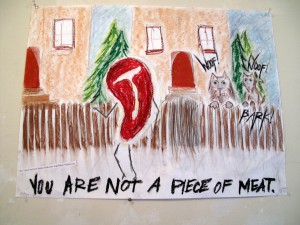Laura Voth, USA, SSH Blog Correspondent

I am twelve years old, walking down the locker-lined hallway of my middle school on the way to the bathroom. The corridor is empty but for two or three eighth-graders loitering outside of a classroom. As I walk by, one of the boys, a red-head, calls out “where you going, pretty girl?” He bares his teeth and narrows his eyes at me, giving a poor imitation of a smile.
I give the boy my fiercest glare and continue on to the bathroom, looking back once to make sure he isn’t following me. As I wash my hands and return to class—taking care to go a different route to avoid running in to the redhead—I think about what has just happened. Surely I shouldn’t feel so upset; a boy called me pretty. Isn’t that a compliment?
At the time, I couldn’t describe why I felt dirty and disgusted by what had happened, and for years afterwards I was still confused. Why did such a seemingly-innocent phrase make my stomach turn? Why did I feel nervous every time I saw that boy in the hallway or at an assembly? I didn’t even know his name—and to this day I still don’t—but that boy made me feel unsafe in an environment that ought to have been something of a haven. More than that, his words made me feel as though I didn’t deserve to be comfortable at school.
I still wonder today what that boy was thinking—why he would choose to make that comment and why it would even occur to him to say it. It’s true that fourteen-year-olds aren’t great at making wise decisions, but this wasn’t an impersonal, largely harmless action. I still remember the look in his eyes and the timbre of his voice—I believe that he knew the impact of what he was saying.
I wonder where that boy learned to call upon women in passing as though he had a right to comment on them. I wonder whether he saw his father or brothers doing it. Maybe he saw it in a music video or a TV show. Maybe he legitimately thought that his comment was a good way to get some positive attention from a girl.
When I tell this story of the first time I experienced street harassment, the listener sometimes indicates that I’ve made a mountain out of a molehill, that the boy’s comment was harmless, and that I ought to let it go (although perhaps I should). But how can someone forget the first time they felt that their personal safety was in immediate danger? I remember that moment as the point when I realized that those around me considered my body fair game for public scrutiny; that my body was not truly my own.
For many women, street harassment starts around puberty, with 90% of women experiencing it before the age of nineteen. Harassment sends a message that the victim doesn’t deserve to feel safe in her environment and that she is not worthy of simply moving through her world without a crude comment tossed her way.
It’s no wonder that girls’ confidence seems to drain away as they emerge into adolescence. With men and boys harassing them at school and in their very own neighborhoods, how can girls be expected to assert themselves in other situations? After all, if they can’t feel safe even moving through their world, venturing outside of their comfort zone—socially, academically, emotionally—becomes an even greater risk. If a thirteen-year-old isn’t able to walk down the street without being catcalled, she won’t explore avenues unfamiliar to her.
Those of us who began experiencing harassment at young ages—and I know there are many who were first harassed younger than I was—need to nurture the girl who still believes she is undeserving of safety and respect. Explain what happened like you would to a niece or a daughter: remind yourself that you are worthy of feeling comfortable in your environment and that nobody has the right to take away your peace of mind.
If I could go back to that day in the middle school hallway as an adult, I’d ask the red-headed boy what he thought gave him the right to accost a girl who was doing nothing more than existing in a public space. I would tell him the impact that his comments can have on a woman—that the women he harasses will likely remember his words for years to come (and may even write articles describing their negative experiences with him).
I would tell that red-headed boy that his actions are neither respectful nor attractive and that no woman has ever thought “damn, I’d love to go out with that guy who catcalled me today.” I’d tell him that the words he says to women in the street are not indicative of his power, but rather of his inability to see women as human beings.
I’d tell him that, while the girl he just catcalled has no idea what to say to him and only knows that she feels confused and violated, he is the one that should be ashamed.
I’d ask him whether his comment was worth the momentary swagger; whether he truly deserved the brief ego-boost more than I deserved to feel safe at school—safe to walk through the halls, safe to make my voice heard, safe to explore my world.
Laura is an emerging adult-slash-college student studying to enter a healthcare profession. In addition to studying and writing, Laura works at her university’s women’s center where she helps design and implement programs on all things lady.
